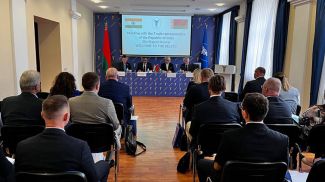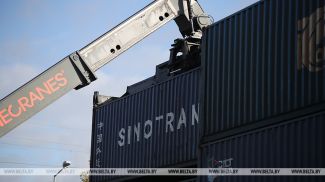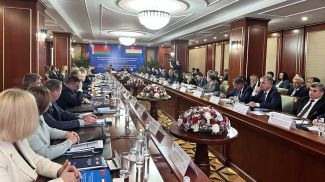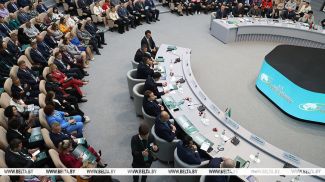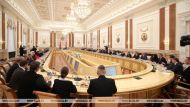MINSK, 23 August (BelTA) – Belarusian Prime Minister Roman Golovchenko summed up the results of the meeting of the Eurasian Intergovernmental Council in Kyrgyzstan in an interview with the Belarus 1 TV channel, BelTA has learned.
"This time we did not have difficult issues and differing positions. But there were many topics on which we needed to align our approaches. Among them was the removal of barriers to access the Kazakhstan market of agricultural machinery. We found a compromise on this issue," Roman Golovchenko said. “We made a decision to accelerate setting up the Eurasian reinsurance organization, which I see as a win of Belarus. For us, this is a beneficial and necessary step in the face of the sanctions which also apply to reinsurance services for Belarusian insurers. We agreed that we would step up work on this front. In the first quarter of next year, the Eurasian Economic Commission will submit an international treaty on this organization,” he added.
Another important issue was the synchronization of export duties in the EAEU. “Due to a feverish demand worldwide, we can see a shortage of certain resources, which are important for our countries. These are grains, timber, metals and paper. When one country turns to tariff protection in the form of export duties, these goods should not be redirected to another country. To prevent such things from happening, we have agreed on synchronization, with the national sovereignty being preserved. We are not talking about unified export duties, but we have agreed to coordinate actions in order to respect the interests of each party,” the prime minister said.
The parties also discussed ways to counteract sanctions. “The EEC is closely monitoring the situation. I hope that by the next summit of the heads of state the commission will be ready to present proposals for a collective response. Yet, it is too early to talk about it. These can be compensatory measures, measures to support the EAEU member state that has found itself under pressure. At the moment, these are Belarus and Russia, but taking into account how unpredictable the situation is, absolutely any state can face such a problem,” Roman Golovchenko noted.
According to him, there was no substantive discussion of the developments in Afghanistan at the meeting of the Eurasian Intergovernmental Council, but the participants of the meeting could not but touch upon this problem in informal communication. “The CIS countries have a fairly long border with Afghanistan, thus, of course, this is a great challenge, a great vulnerability. We exchanged views on how this situation might affect us. But it is too early to draw any conclusions, it is not clear how the internal political situation will evolve in Afghanistan. Of course, if necessary, we will take joint action within the framework of all integration associations - the CIS, the CSTO, and the EAEU. Mutual support is needed now more than ever,” the prime minister noted.




